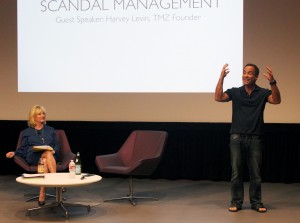Founder of TMZ speaks to students
Harvey Levin, founder and former managing editor of TMZ, visited the Journalism 381: Entertainment, Business and Media class on Tuesday night at the Annenberg School for Communication and Journalism.

Scandal · Harvey Levin (right) managing editor of TMZ speaks as part of Professor Mary Murphy’s (left) Journalism 381 course on Tuesday night. – Kevin Fohrer | Daily Trojan
He led a discussion about the future of broadcast and digital journalism, as well as the ethics behind paying sources for photos and videos.
Professor Mary Murphy, who teaches the class, said her goal in bringing Levin was to show students how his staff goes about finding and running the most talked-about stories of the day.
“He’s driving the entertainment coverage across the entire country,” she said.
Before the class, many students were only generally familiar with TMZ, mainly for being quick at breaking celebrity news scandals. Levin anticipated this, and he stressed that TMZ’s staff vets stories for accuracy and revealed why they are so often the first to run breaking news articles.
“We have more contacts, better contacts, than just about all of the other news outlets combined,” Levin said. “You don’t get these stories by [saying] ‘Oh, I’m out to get you.’ There’s a reason people work with us — it’s because they trust us. The ‘feel right’ thing is a guiding light in what we do.”
After hearing Levin say that his staff considers ethics and possible outcomes of running specific stories each day, some students’ opinions of the news outlet changed.
“I always pictured TMZ as a trashy gossip website, but all of his stories, he doesn’t break unless they’re 100 percent true, so that changes my perception of TMZ,” said Tiffany Luke, a senior majoring in business administration. “Overall, now I do see them more as a legitimate website.”
TMZ has long been scrutinized for paying sources for photos and videos, but Levin defended this practice. Both he and Murphy said that most news outlets do the same thing but not publicly.
“It’s absurd to say that we’ll make money off of a photo and [the source who sent it] won’t,” Levin said. “If a story is important and we think there’s value in the video, we’ll pay for it.”
Levin went on to say that though TMZ is open to paying for photos and videos, the site will never pay for information, which he says incentivizes sources to skew facts and taints a story. Paying for news tips, he said, is a very rare exception.
“It’s kind of refreshing to hear that he’s only paying for media as opposed to flat-out stories and information,” said Ivan Chu, a senior majoring in classics. “I still have a lot of discomfort from it; it still feels like a moral line being crossed, and there’s always the hazard that journalism could turn into people just cutting checks.”
Others were struck by Levin’s strong opinion that television is archaic and will be obsolete in five years. This belief, along with a desire for a newer type of media, is what drove Levin to create TMZ.
“There has not been a sophistication in the news business for 50 years,” he said. “It is the same product, it’s boring and, to some extent, it’s irrelevant. I don’t see the imagination in it, and I don’t see young people going to it.”
Instead of seeing broadcast and digital journalism continue as separate forms, Levin hopes that they will have what he calls a “convergence,” which he thinks young journalists must have the ability to bring about.
“I was definitely going to go the traditional television route, but since he said that in five years, our jobs might not exist, there’s something to reconsider,” said Michelle Tak, a junior majoring in broadcast journalism. “It’s kind of a rude awakening.”
Levin closed by advising aspiring journalists to begin their careers by working for local outlets and to freshen up their content by introducing more youthful ideas.
“Local news stations are looking for young people who can come up with fresh ways of presenting,” Levin said. “If you can do that, you’ll take off like a rocket.”

